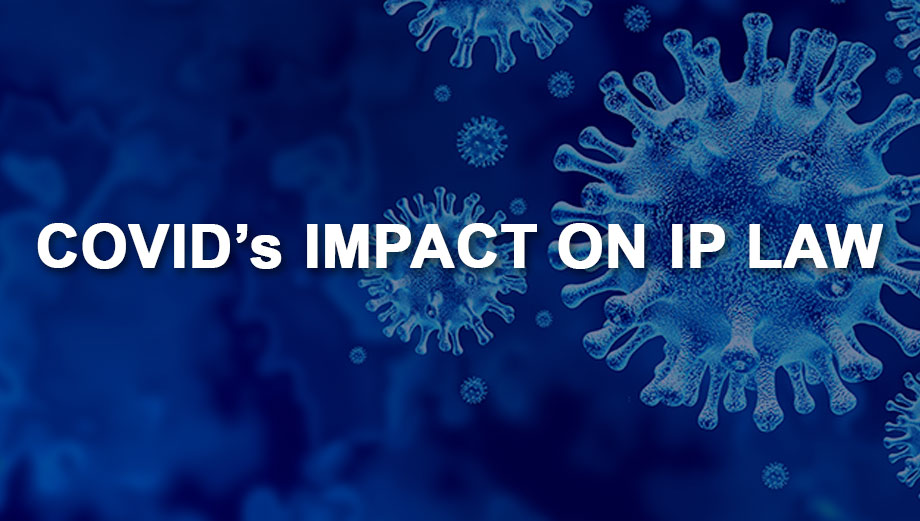The COVID-19 pandemic has forced massive worldwide changes that impact all areas of life, including the practice of law. Fortunately for Intellectual Property (IP) law, a solid infrastructure for electronic communications was already in existence which has minimized disruptions.
In the United States, the start of the electronic infrastructure was put in place in response to the 2001 anthrax attacks, when mail containing anthrax spores began arriving in Congressional offices and the USPTO shared a mail sorting facility with Congress. In 2003 the USPTO began to replace its paper file system with electronic files. Currently, almost all filings are done through the USPTO website. Worldwide, a number of major IP offices also had an electronic infrastructure in place. For example, in December 2019 the World Intellectual Property Organization (WIPO) discontinued fax service and exclusively required electronic communication.
The bottom line — the practice of IP law hasn’t had to skip too many beats because of COVID. The biggest impact has been in limited cases where it is necessary to submit certified paper copies of foreign application documents because a country does not participate in the electronic priority document exchange program.
US Patent and Trademark Office (USPTO)
Like many federal facilities, the USPTO offices closed to the public on March 16, which restricted in-person activity there. In addition to its headquarters in Alexandria, VA, the USPTO also has satellite offices in Dallas, TX, Denver, CO, Detroit, MI, and San Jose, CA. Many Patent Examiners and Trademark Attorneys have teleworked remotely for years, so it was relatively easy to move to a virtual work environment and USPTO business has not suffered a significant disruption. Any appeal hearings are now conducted via phone or video.
On March 16, 2020, the USPTO announced it was considering the effects of COVID to be an “extraordinary situation” akin to Hurricane Katrina (albeit on a national scale) and was waiving petition fees to revive abandoned applications in certain circumstances (but not extending filing deadlines). On March 19, 2020, the USPTO waived the remaining requirements for original handwritten signatures and now accepts electronic signatures for all submissions.
On March 27, the Coronavirus Aid, Relief and Economic Security Act (CARES Act) was signed into law. The Act gave USPTO Director Andrei Iancu the power to “toll, waive, adjust, or modify, any timing deadline established by [the patent and trademark statutes] or regulations promulgated thereunder.” The USPTO has extended certain patent and trademark deadlines, but an extension is not automatic, may be evaluated on a case-by-case basis, and at a minimum requires an assertion that the delay “was because the practitioner, applicant, or at least one inventor, was personally affected by the Coronavirus outbreak such that they were unable to file a timely reply.” A similar statement is required for trademark documents. USPTO customers are meeting the existing deadlines and COVID extensions are being rarely requested.
US Copyright Office
Like the USPTO, when the pandemic hit the U.S. Copyright Office promptly closed its offices to the public and moved to teleworking for its staff. Processing continues for electronic copyright registration applications. Paper applications and paper deposit materials however, will not be processed until the Library of Congress building reopens. Still being worked out is the impact on the mandatory deposit requirements which provide the Library of Congress with physical (not electronic) copies of the copyrighted works.
Once the CARES Act was passed, the Register of Copyrights extended copyright registration and other deadlines in situations where applicants can demonstrate the delay resulted from the COVID-19 pandemic.
Federal and State Courts
There is no uniform response to the pandemic outbreak by courts, and jurisdictions have widely varying procedures. Intellectual Property litigation is generally conducted in the Federal Courts, and the Federal Courts have continued to operate.
On March 19, the U.S. Supreme Court issued a 150-day extension for petitions for a writ of certiorari and noted that the Clerk may grant other extensions. Oral arguments for certain cases are being handled remotely. The Court may postpone some cases even further, including those with significant impact for the technology industry.
Worldwide Patent/Trademark Offices
A number of jurisdictions — such as Canada, the European Patent Office, the Indian Patent Office, and the Japanese Patent Office — have pushed back due dates (some automatically and some upon request), but customers have generally not taken advantage of the delayed dates.
There are practical considerations in deciding to use the delayed dates, including having to manually re-docket the delayed dates and the risk that the reason for the delay is not appropriate (i.e., not COVID related). Furthermore, international filing dates are generally set by treaty and patent terms are based on the filing date, so there is a disadvantage to delay since patent terms have not been extended.
Moving Forward
A voluntary initiative, the Open COVID Pledge, grants free, temporary, access to IP rights to benefit the greater good. In addition, some universities have agreed to rapid, royalty-free licensing of COVID related technologies. This is a silver lining as businesses, organizations and governments step up to the plate to address the urgent needs arising from the pandemic.
The USPTO also recently announced a COVID-19 prioritized examination pilot program in which the USPTO will accelerate examination of COVID-19 related patent applications, without additional fees, for independent inventors and certain small businesses. Under this pilot program, the USPTO will endeavor to reach final disposition of applications within six months.
Author: Stanley D. Ference, III, Esquire

